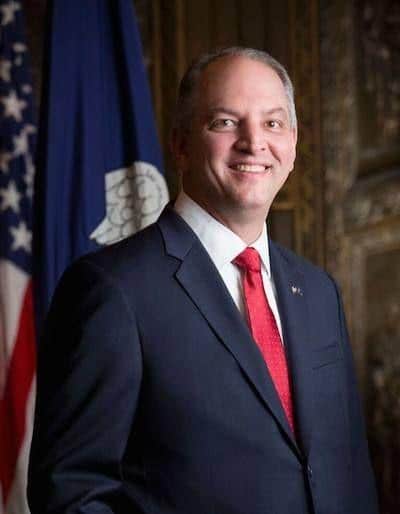
Entergy partners with United Way to distribute bill credits to customers
August 9, 2022
TPSO asking for help in identifying two theft suspects
August 9, 2022Gov. John Bel Edwards and more than a dozen Louisiana economic, coastal and business leaders will shift their quest for exportable water management insights from Amsterdam to France on Tuesday, the third day of a weeklong mission to Europe.
Following a high-speed rail trip from Amsterdam to Paris, the governor will head directly to the Luxembourg Palace to visit the 348-member French Senate, one of two legislative chambers in the French Parliament.
The second leg of the mission follows a daylong fact-finding tour of flood control sites in three different areas of the Netherlands on Monday, which began 50 miles south of Amsterdam with a tour of the massive Noorwaard depoldering project in Werkendam. Polders are low-lying coastal or riverfront areas formerly underwater but turned to dry land after the construction of dikes. The depoldering of Noorwaard was a key component of the Room for the River water management project that the Dutch began in 2006 to protect coastal communities along the Rhine River.
“This mission is a powerful reminder that Louisiana residents are kindred spirits with the Dutch, who have embraced creative solutions for living with, rather than fighting against, water for generations,” Gov. Edwards said. “The Noorwaard depoldering resembles similar projects within Louisiana’s Coastal Master Plan. To view in person the positive impact of this years-long undertaking reaffirms our state’s visionary, long-term approach to the water challenges we face. How to apply the lessons of Room for the River to our own coastal programs will be a focus of follow-up discussions today and in the days to come.”
Dr. Franz Klijn, a Dutch specialist in flood risk and water resources management, briefed the delegation on Room for the River, which has created nearly 20 miles of new dikes, 33 new bridges, 60 new hydraulic structures and 12 new pumping stations at 34 different locations around the country.
“This is a unique opportunity for us to learn from a group of people fighting some of the same challenges we face every day, but it’s also a chance for other countries to learn from the significant progress we have made over the last several years,” CPRA Chairman Chip Kline said. “While the Dutch are known internationally for living with and managing water, Louisiana is being looked at more and more as a global leader in addressing and reacting to a changing climate.”
From Noorwaard, the delegation traveled to a world heritage site in Kinderdijk, considered by many to be the birthplace of modern water management due to the 19th century windmill and steam-powered pumping station innovations that originated there. The delegation continued its exploratory journey in Delft, home to Deltares, a leading not-for-profit water management consultancy and research institute whose sprawling complex served as a model for Louisiana’s Water Campus in Baton Rouge.
At Deltares, Gov. Edwards met with Netherlands Water Envoy Henk WJ Ovink to discuss the ongoing water management collaboration between Louisiana and the Netherlands. The delegation also saw a demonstration of the Delta Flume, the most advanced wave test facility in the world, able to simulate at full scale the effect of extreme waves on dikes, levees, dunes, breakwaters and offshore structures.
“We had a frank exchange of ideas and discussed the challenges facing both Louisiana and the Netherlands,” Deltares Director of Hydraulic Engineering Dirk-Jan Walstra said. “As low-lying deltas, climate change and sea level rise have a huge impact on our regions. We were also proud to show Governor Edwards and the delegation of the Deltares experimental facilities, including the Delta Flume, and stressed the importance of using these facilities alongside our software to provide sound knowledge-based advice for policy makers. We hope that we can continue to share knowledge and expertise together, learning from each other as we deepen our collaboration with The Water Institute.”







